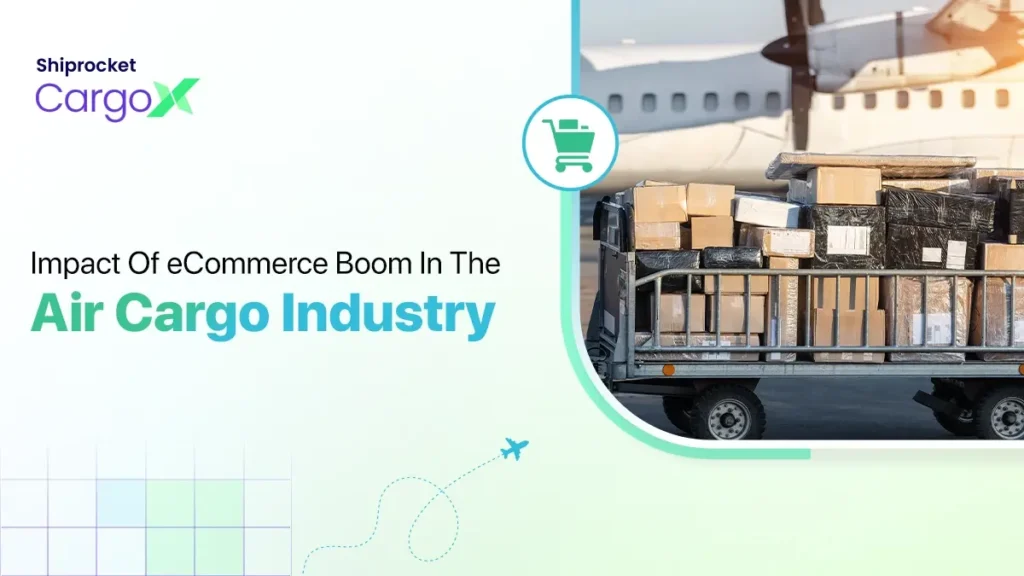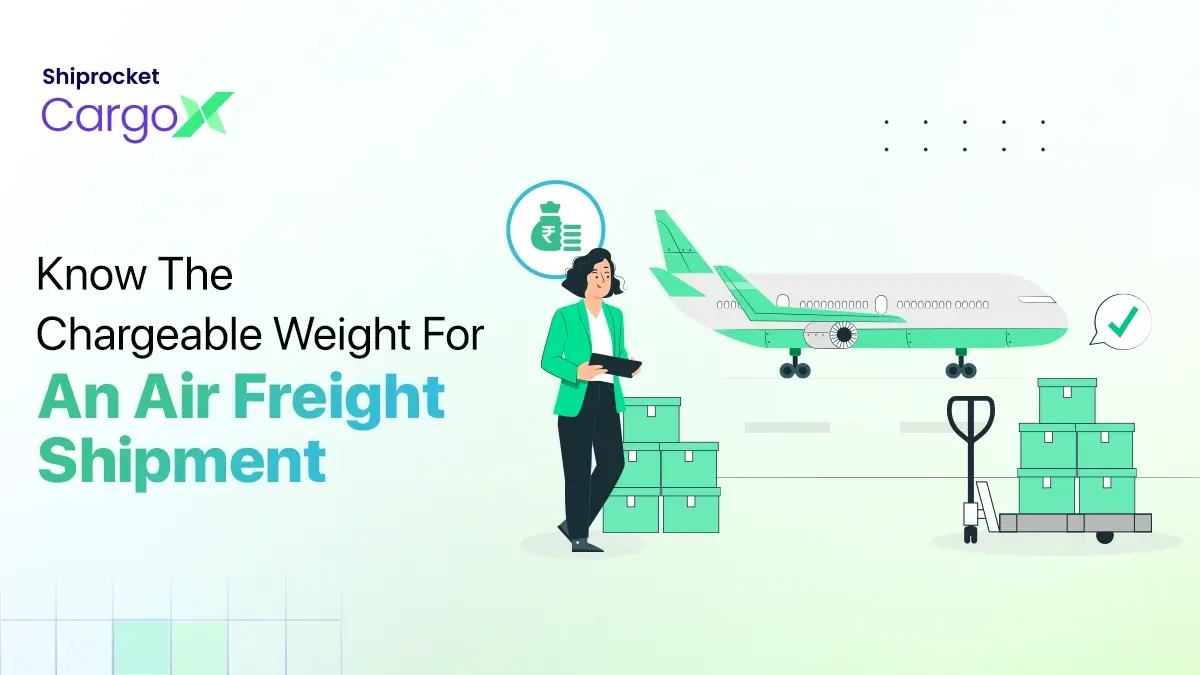How is eCommerce Transforming the Air Cargo Industry?
- The Big Picture of the Air Cargo Industry
- Influence of eCommerce Boom on the Air Cargo Industry
- Challenges Posed by the Flourishing eCommerce For the Air Cargo Industry
- Strategies to Accommodate Changing eCommerce Demands
- Technology Revolution in the Air Cargo Industry
- Emerging eCommerce Trends Opening Opportunities to the Air Cargo Industry
- Keeping Pace With eCommerce Growth: Tips for Logistics Services
- How is the Air Cargo Industry Benefiting from eCommerce Growth?
- How Equipped is the Air Cargo Industry to Meet the Demands of Growing eCommerce?
- How will eCommerce Surge Shape the Future of the Air Cargo Industry?
- Staying Relevant With the Changing Market Demand: Guidance for Air Cargo Industry
- Conclusion
Recent years have seen amazing growth in the eCommerce industry globally. The massive increase in online shopping has boosted several other sectors, including the air cargo industry. This online shopping trend has increased the need for swift and secure shipment of parcels to domestic and international customers. This demand greatly propelled the growth of the air cargo industry in the last few years. It has also created new challenges along with opportunities.
Between 2022 and 2027, the air cargo market is expected to increase by 19.52 million tons at a compound annual growth rate of 5.32%.
Today consumers look for real-time information related to their cargo shipment such as current status or location, delivery status, and more. Due to this, air freight forwarders need to adjust to the new market trends so that they are also able to render digitized end-to-end services to eCommerce businesses and their customers.

The Big Picture of the Air Cargo Industry
Air Freight is one of the fastest and most reliable modes of transportation for eCommerce goods, particularly for perishable and time-sensitive items. It is one of the most significant segments of the global logistics market. The global air freight volume has risen immensely in recent years, reaching 65.6 million metric tons in 2021.
The air cargo industry is vast, comprising numerous services such as moving freight on passenger aircraft, cargo aircraft, full charter flights, and express courier operations. These many reliable and fast methods for air cargo shipping, the ever-growing eCommerce business, and the expansion of the majority of them into the global market will further increase the growth of the air cargo industry in the coming years.
Influence of eCommerce Boom on the Air Cargo Industry
There has been a huge expansion in the air cargo industry owing to the flourishing eCommerce businesses. Since more and more people are shopping online, there is a greater need than ever for things to be delivered quickly and reliably. Air cargo is ideally suited for this logistical problem. The technological advancements that drove infrastructure development in the aviation industry have supplemented its growth. The air cargo industry has undergone a tech-enabled transformation to ensure that it is well-equipped to handle the surge in eCommerce shipment volume and demands. With the eCommerce businesses expanding to international markets, global connectivity has increased. This has opened up numerous business opportunities, allowing freight forwarders to flourish.
As more customers pick digital solutions to manage their shipments, the air cargo industry is also opting for automated systems and platforms to meet customer needs. The global air cargo demand increased by 8.3% in November 2023 compared to November 2022. Increased eCommerce shipments are one of the reasons for this growth.
Challenges Posed by the Flourishing eCommerce For the Air Cargo Industry
Some of the challenges posed by eCommerce growth to the air cargo industry are:
1. Managing customer expectations
The air cargo industry faces numerous operational challenges, such as weather conditions, air traffic control restrictions, and many more. Regardless of all this, customers want their deliveries on time. Thus, meeting these requirements is not easy as all these are uncontrollable factors.
2. Safety and Security
As eCommerce is growing, more and more parcels will be processed and moved by air cargo companies, increasing the chances of having shipped illegal or hazardous goods. Therefore, IATA is creating rules and regulations to reduce potential risks.
3. Increased Competition
With the rapid growth in the eCommerce industry, the demand for air cargo services has also increased simultaneously. Today, customers expect deliveries within the same day or 72 hours at most, and that too if it’s international shipping. This has pressurised the air cargo companies to ramp up the speed of their operations and optimise their capacity utilisation. This way air cargo services have to compete with each other to provide better and gain clients.
Strategies to Accommodate Changing eCommerce Demands
Digital technologies are revolutionising trade. Considering the rapid advancement and growth in the eCommerce sector, the air cargo industry is expected to double in size by 2035. Thus, it is essential to accommodate the changing eCommerce demands if an air cargo company wishes to stay ahead of its competitors. Here are some strategies to accommodate the changing eCommerce demands:
1) Digitisation
The long paperwork is the most tiresome and time-consuming activity. Transforming completely to digital documentation will make the entire cargo movement process quick and simple. This will reduce the chances of errors and avoid delays. Opting for digital platforms will help standardise the process and enhance cargo movement.
2) Value-Added Services
To gain an edge over competitors, an air cargo shipping company should aim to provide value-added service. For example, customs clearance, insurance, digital and express services for cargo, etc.
3) Invest in Research and Development
Air cargo companies should invest in R&D as it will help them keep up with industry trends and streamline the process. This will in turn help increase customer loyalty.
Technology Revolution in the Air Cargo Industry
Embracing technological advancements and staying up-to-date with industry trends in the air cargo sector is a must. Below are some of the technological advancements in the air cargo industry:
1) Real-time Tracking and Monitoring
The consignees and shippers can now track where their shipment has reached. From the origin to the final destination, they can do real-time tracking. Several platforms provide real-time tracking, freight management, customs compliance, and reporting capabilities, which was unimaginable a few years back.
2) Digitalisation and Automation
Technological advancement has revolutionised the air cargo industry and streamlined the entire logistics process. Now, most things are automated, which means the risk of human errors is eliminated, leading to faster processing and enhanced operational efficiency.
With the adoption of AI and IoT, the air cargo industry is creating new efficiencies and more transparency in the entire logistics supply chain. AI-powered robots and drones are being used in inventory and delivery management to reduce the workforce. Technological innovations such as Robotic Picking Systems and Automated Guided Vehicles (AGVs) eradicate the need for manual labour and give an edge to improve speed and efficiency.
Many cargo handling facilities have employed Artificial Intelligence, Machine Learning, IoT, Blockchain, and Data Science to enhance their operations. Automatic sorting systems and autonomous cargo vehicles have changed the functionality of cargo shipments. This will not only speed up the process but also improve safety.
Numerous cargo companies use blockchain technology to increase security, enhance the transparency of the delivery process, reduce fraud, and improve trust. This technology will provide details on all activities, such as booking, delivery, payment, and customs clearance.
Emerging eCommerce Trends Opening Opportunities to the Air Cargo Industry
Numerous eCommerce trends will open several opportunities for the air cargo industry to flourish. Some of them are:
- Digitisation and Data-driven Logistics– Owing to an increase in eCommerce activities, the demand for the logistics sector has also multiplied. This has led to digitalisation and data-driven logistics, such as real-time tracking systems, and the usage of AI to optimise route planning, cargo handling, and inventory management.
- Infrastructure Upgrades– Due to the inflated market for air cargo, airports, and logistic hubs are undergoing various upgrades. A considerable amount of investment has been made in modern infrastructure to maintain the competence and productivity of air logistics.
- Blockchain for Supply Chain Transparency– To improve supply chain transparency and security, Blockchain technology is finding new applications. It will ensure the integrity of the data that is associated with air cargo movements and lessen the risk of errors.
- Omni-channel retail– Owing to the consolidation of online and offline retail channels, many organisations have started to focus on creating a flawless shopping experience. This trend demands synchronised inventory across various channels to avert inventory shortage or overstocking.
Keeping Pace With eCommerce Growth: Tips for Logistics Services
Moving along with eCommerce growth is pivotal for logistics services as it is an ongoing process. Here are some of the areas to work on:
1) Distribute your inventory-
Keeping all the inventory in one location can save you money but can have the opposite effect when you grow. If you store everything in one place, you will have to spend more money on shipping, or your customers will have to wait for more to get their products delivered; you are at a loss both ways. For instance, if logistics service providers keep everything in Delhi, then it would cost more to deliver goods in Bangalore or Chennai. So, it’s better to have multiple warehouses scattered at prominent locations to save on shipping expenses.
2) Manage your inventory-
Inventory management is more than just storing and shipping products; you have to do a lot more than that. As you grow, it becomes essential that every channel and department can communicate with each other using the same set of data.
If air cargo companies manage their inventory efficiently, it allows them to plan their production and procurement activities effectively. This leads to streamlined operations and eliminates the possibility of wastage.
3) Managing peak business months-
Numerous festivals call for a lot of deliveries, and this is where you need to prove yourself, as there is an urgent need for eCommerce logistics to ensure healthy supply chains and create a flawless supply of goods for the increased demand.
Managing this increased demand during peak times needs better inventory management, implementation of effective shipping solutions, and technology integration.
4) Build a robust logistics network-
Try to build a robust network as a logistics service provider, which will give you complete control over the quality and timely delivery of the goods. It provides real-time visibility throughout the operations, which enables businesses to identify supply chain issues and multiply productivity by streamlining communication with deep insights and data.
How is the Air Cargo Industry Benefiting from eCommerce Growth?
The air cargo industry enjoys several benefits from the eCommerce growth. Some of them are:
- Online shopping boom has helped increase the demand for air cargo
- The airline industry has seen a huge spike in revenue because of the increased shipping needs of the eCommerce sector
- eCommerce has helped the air cargo sector move towards being a more efficient, fast, and automated industry
- Rapid digitalisation to accommodate the enormous eCommerce shipments has enhanced the cargo processes.
How Equipped is the Air Cargo Industry to Meet the Demands of Growing eCommerce?
eCommerce has led to a tremendous increase in air freight shipments, demanding the air cargo industry to be faster and more efficient. Although there have been a lot of changes in the industry, there is still a long way to go.
A lot of companies are investing to modernise their operations, yet there are numerous challenges. It is also important for them to adhere to international standards and regulations.
The industry is taking necessary steps to boost eCommerce operations. One vital step taken is the introduction of ‘preighters‘ (passenger planes converted into freighters) and the adoption of new technologies to streamline their operations. Another progress is the use of automation programmes that have improved the aircraft scheduling process. Additionally, to meet the demand of growing eCommerce, the air cargo industry is also streamlining trade document processing.
How will eCommerce Surge Shape the Future of the Air Cargo Industry?
The surge in online shopping and cross-border eCommerce is transforming the air cargo sector. However, this dynamic environment requires this industry to improve cargo handling facilities and expand runways.
The future of the air cargo industry is not just opting for technological advancements; it is a recital of responsibility and evolution. The booming eCommerce has made a tremendous impact on customer expectations. One such factor that rose to prominence these days is environmental sustainability. Young environmentally conscious shoppers tend to choose logistic providers adopting green logistics practices.
Another challenging factor for the air cargo industry is receiving the shipment on time. The solution to this problem is a collaborative effort that enhances the efficiency of operations.
The air cargo businesses are implementing new digital processes and adhering to operational standards to boost revenue and drive accuracy.
Staying Relevant With the Changing Market Demand: Guidance for Air Cargo Industry
Shipping the products by air is a fast and efficient means of transport. Over 52 million metric tons of goods are transported by air worldwide yearly. Thus, it is imperative to keep up with the changing industry trends, understand the market dynamics and identify potential growth areas.
To lead in the air cargo industry, the cargo company must be fully aware of the technological advancements, market trends, and growth drivers. This can be achieved by doing an in-depth market analysis. This will also help you comprehend the competitive landscape and identify potential partners or competitors.
Conclusion
The ascending growth of online shopping fuels a substantial demand for the air cargo industry. Online retailers have given consumers more choices than ever when it comes to product selection, pricing, and convenience. As the eCommerce industry moves forward, we can expect more innovative developments to reshape the air cargo sector further.
Today, many eCommerce businesses use air freight to increase delivery speed and satisfy customer expectations. The faster delivery times provide customers with a seamless and convenient experience. To ensure swift deliveries, eCommerce businesses should partner with a reliable logistics service like CargoX. You will be able to experience an excellent blend of operational ease and expertise, making your shipments easier than ever before. CargoX has a digitised workflow, complete shipment visibility, easy documentation and no weight restriction to enhance your shipping experience.




